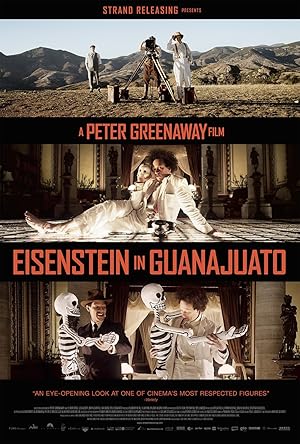
Eisenstein in Guanajuato Page #4
Don't worry. I'm a foreigner.
I'm a child abroad.
Russia's so big
that nobody thinks about abroad.
It's always too far away and well out of sight.
- (CHUCKLES)
- We believe most of the time
that "abroad" does not really exist.
Does not really exist. Does not really exist.
I was earning money
from American publishers,
and I bought an old battered Ford car.
Mayakovsky had a Renault,
at 40 miles an hour with our windows down,
shouting, singing,
- and mooning.
- Oh!
He had a nice arse. My arse was way too fat.
He got his car impounded for moral turpitude.
Mayakovsky, that is, not his car.
His car was innocent.
Is this car, with Death in the driver's seat,
completely innocent?
No fat on his backside.
In 1927, Mary Pickford and Douglas Fairbanks
of Universal Pictures,
Charlie Chaplin's company,
to come to Hollywood
to make a film! Hooray! Hooray! Hooray!
(CHILDREN CHEERING)
I met them all. All those Hollywood guys.
They all came to Moscow.
Would you believe it?
Joseph Schenck lost in Russia,
but he looked like a Russian smoothie.
All Jews look lost in Russia,
but there is never a better home for them.
He fast-smoked big cigars.
He was a caricature.
It was to make sure no one took him seriously
so he could take everyone else seriously
when they weren't looking.
I am a caricature. I don't smoke fast,
but I can talk fast, don't you think?
Joseph Schenck
came with a Hollywood contract
in his pocket, which was soon in my pocket.
And then my pockets were filled
with Hollywood happiness.
Felicidad Hollywoodus.
(CLASSICAL MUSIC)
To get to Hollywood,
you must first pass through Europe,
and then you have to pass through America
because Hollywood is a separate country
all on its very own.
So like bug-eyed cultural tourists,
we went through Europe,
looking, seeing, shaking hands.
Although it was more like
shaking hands and looking.
I had eyes in my hands,
and they never stopped shaking.
We met George Grosz and Man Ray
and Dos Passes.
Oh, Kthe Kollwitz.
She had at least half a way
for social conscience,
though her droopy face and sagging breasts
were overplayed as a sort of trademark.
And Le Corbusier,
who said I reminded him of Donatello.
All architects love cinema.
We met Lger and Cocteau
and Marinetti, who was a fool.
Terrible poetry, worse painting.
Oh, we met James Joyce,
who sat through Battleship Potemkin
in his dark blind glasses.
I imagine he did not see a thing.
We met Abel Gance and Buuel.
And Al Jolson, the blacked-up
singing son of a Russian rabbi.
- This one.
- (GRUNTS)
We saw Dal's Le Chien Andalou
and Dreyer's Joan of Arc.
Translation
Translate and read this script in other languages:
Select another language:
- - Select -
- 简体中文 (Chinese - Simplified)
- 繁體中文 (Chinese - Traditional)
- Español (Spanish)
- Esperanto (Esperanto)
- 日本語 (Japanese)
- Português (Portuguese)
- Deutsch (German)
- العربية (Arabic)
- Français (French)
- Русский (Russian)
- ಕನ್ನಡ (Kannada)
- 한국어 (Korean)
- עברית (Hebrew)
- Gaeilge (Irish)
- Українська (Ukrainian)
- اردو (Urdu)
- Magyar (Hungarian)
- मानक हिन्दी (Hindi)
- Indonesia (Indonesian)
- Italiano (Italian)
- தமிழ் (Tamil)
- Türkçe (Turkish)
- తెలుగు (Telugu)
- ภาษาไทย (Thai)
- Tiếng Việt (Vietnamese)
- Čeština (Czech)
- Polski (Polish)
- Bahasa Indonesia (Indonesian)
- Românește (Romanian)
- Nederlands (Dutch)
- Ελληνικά (Greek)
- Latinum (Latin)
- Svenska (Swedish)
- Dansk (Danish)
- Suomi (Finnish)
- فارسی (Persian)
- ייִדיש (Yiddish)
- հայերեն (Armenian)
- Norsk (Norwegian)
- English (English)
Citation
Use the citation below to add this screenplay to your bibliography:
Style:MLAChicagoAPA
"Eisenstein in Guanajuato" Scripts.com. STANDS4 LLC, 2024. Web. 19 Apr. 2024. <https://www.scripts.com/script/eisenstein_in_guanajuato_7513>.


Discuss this script with the community:
Report Comment
We're doing our best to make sure our content is useful, accurate and safe.
If by any chance you spot an inappropriate comment while navigating through our website please use this form to let us know, and we'll take care of it shortly.
Attachment
You need to be logged in to favorite.
Log In